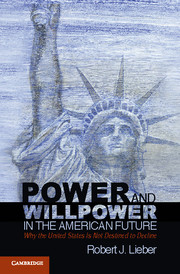Book contents
3 - American Attitudes and Institutions
Published online by Cambridge University Press: 05 June 2014
Summary
“The great privilege of the Americans does not consist in being more enlightened than any other nations, but in being able to repair the faults they may commit.”
– Alexis de TocquevilleCan America sustain an international role comparable to the one it has played in world affairs for the past seven decades, that is, from the early years of World War II to the present time? The answer depends both on the domestic basis on which this leadership rests and on the international setting in which it takes place. This chapter delves into the attitudes, policies, and institutions that shape this special role and determine America's ability to lead.
As Tocqueville’s words written in the 1830s suggest, informed observers have long noted America’s capacity to adapt, repair, and constantly renew itself. But if there is an enduring basis for the robustness and resilience of the United States as an economy, society, and polity, there remain other attributes that can impede successful adaptation to new challenges and threats. The unique characteristics of America, embodied in exceptionalism and the openness of its society, have made it a leader in world affairs and a magnet for people from other lands. The costs of exceptionalism can be found, however, in the often raucous political climate, the unwieldiness of some of the institutions bequeathed by the Founding Fathers, and the difficulty of crafting solutions for pressing problems until these reach crisis proportions. Political polarization and domestic dissensus exacerbate these tendencies and have been increasingly evident among political elites since at least the early 1990s. As a result, partisan rancor and inability to agree on national policies and strategies could prove to be greater impediments to America’s staying power than the more commonly cited problems of economic difficulty and military overstretch.
- Type
- Chapter
- Information
- Power and Willpower in the American FutureWhy the United States Is Not Destined to Decline, pp. 59 - 79Publisher: Cambridge University PressPrint publication year: 2012



